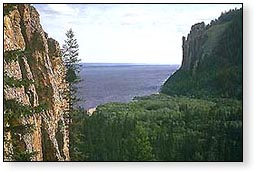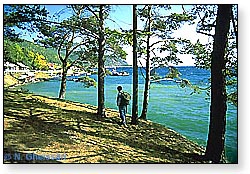 Baikal
Baikal
The Pearl of Siberia
 As the vast evergreen
forests of Russia's Siberian taiga extend southward toward Mongolia, the
ground rises and the terrain becomes more varied. The border between
Siberian Russia and Mongolia is a natural divide here, with rugged hills
and mountains forming series of wrinkles between the sprawling Russian
forests to the north and rolling grasslands to the south. About midway
along this border, in a gigantic stone bowl nearly four hundred miles (636
km) long and almost fifty miles (80 km) wide, lies almost one quarter of
the all the fresh water on earth--Lake Baikal.
As the vast evergreen
forests of Russia's Siberian taiga extend southward toward Mongolia, the
ground rises and the terrain becomes more varied. The border between
Siberian Russia and Mongolia is a natural divide here, with rugged hills
and mountains forming series of wrinkles between the sprawling Russian
forests to the north and rolling grasslands to the south. About midway
along this border, in a gigantic stone bowl nearly four hundred miles (636
km) long and almost fifty miles (80 km) wide, lies almost one quarter of
the all the fresh water on earth--Lake Baikal.
Baikal is easily the largest lake in Eurasia, and it is just as easily the deepest lake in the world (1,620 metres). On the merits of magnitude alone the lake is renowned as one of the earth's most impressive natural wonders, and rightfully so--Baikal is so large that all of the rivers on earth combined would take an entire year to fill it.
What fewer people realize, however, is that Baikal's majestic expanse is situated in a region of surpassing beauty, its forested shores surmounted by the jagged, snow-clad peaks of the Barguzin mountains. In the winter Baikal freezes over, with ice so thick that the Trans-Siberian Railway was briefly run over its surface. At this time of year the lake provides an unsurpassed venue for the pleasures of a tour by sleigh. In the summer, its crystalline blue waters are transparent to a depth of forty meters, and its shores are ringed with the brilliant colors of seasonal wildflowers. Boat tours offered during the warm months are one of the best ways to gain an introduction to the lake, as is hiking amongst the forests, streams, and waterfalls of Baikal's parks. The lake region is home to an enormous variety of plants and animals, most of which--like nerpas,the lake's freshwater seals, and its trademark delicacy, the omul salmon-- are found nowhere else in the world. Bears, elk, lynx, and sables abound in the surrounding forests.
 Lake Baikal long ago became famous for the purity of its waters and
surrounding shores, a pristine state that had been seriously threatened by
planned industrial development in recent years. Luckily, Baikal was one of
the first regions to benefit from the new Russian government's reversal of
decades of anti-environmental industrial policies. Since 1992 Lake Baikal
and the entire surrounding area have been designated as a national park,
and Baikal is today a naturalist's paradise and an idyllic holiday
destination. With fine beaches, excellent hiking, birdwatching, and
pleasure boating, Baikal is well-positioned to become one of the most
attractive vacation spots in Asia.
Lake Baikal long ago became famous for the purity of its waters and
surrounding shores, a pristine state that had been seriously threatened by
planned industrial development in recent years. Luckily, Baikal was one of
the first regions to benefit from the new Russian government's reversal of
decades of anti-environmental industrial policies. Since 1992 Lake Baikal
and the entire surrounding area have been designated as a national park,
and Baikal is today a naturalist's paradise and an idyllic holiday
destination. With fine beaches, excellent hiking, birdwatching, and
pleasure boating, Baikal is well-positioned to become one of the most
attractive vacation spots in Asia.
Copyright (c) 1996-2005 interKnowledge Corp. All rights reserved.







